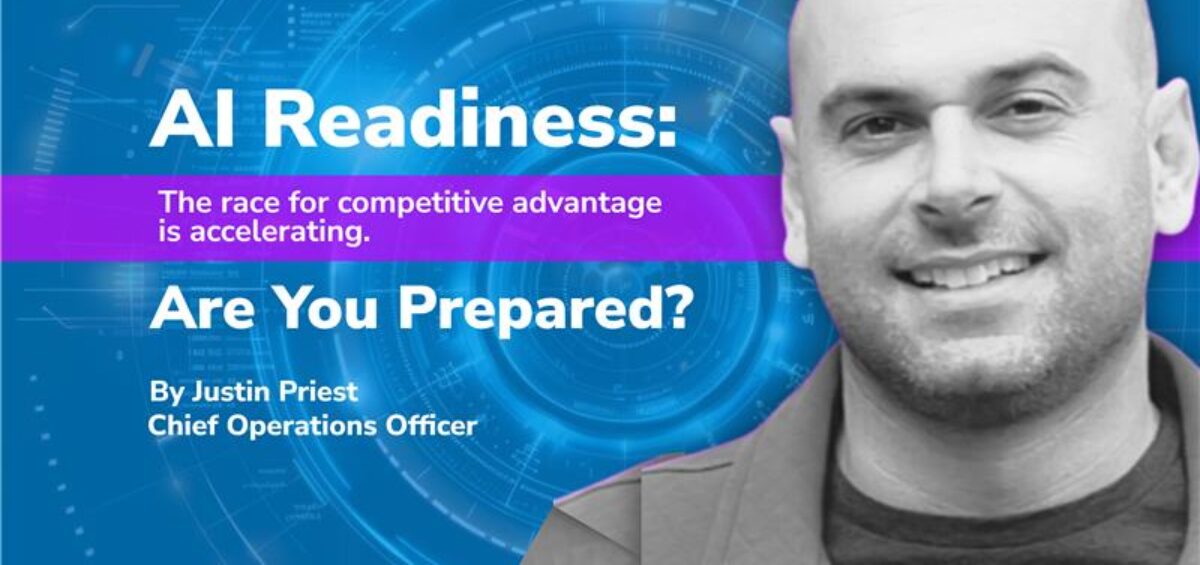This statistic should make every executive pause: 86% of consulting buyers are actively looking for services that incorporate AI.
Not because AI is new. It’s not. But because the window for competitive advantage is closing faster than most organizations realize.
We’re past the “should we adopt AI?” conversation. The question now is whether your organization is ready when the opportunity arrives. Every leader is becoming an agent boss, responsible for teams that blend human expertise and AI execution. Yet most governance structures were never designed for that reality. Based on what we’re seeing across our client base, many organizations simply aren’t ready.
THE READINESS GAP WE’RE SEEING
In the past six months, we’ve worked with dozens of organizations eager to deploy AI solutions. They’ve read the case studies, seen the ROI projections, and secured budget approval. But when we start asking foundational questions, the conversation stalls.
Do you have a clear AI strategy that aligns with business outcomes? Most don’t. They have enthusiasm and funding, but no roadmap connecting AI capabilities to specific problems worth solving.
Is your data governance in place? 72% of enterprises engaged external AI consultants citing the complexity of AI implementation as a primary motivator. That complexity often starts with data. Without proper classification, quality standards, and access controls, AI projects become expensive experiments that never reach production.
Are your teams trained? Not just on tools, but on how to work alongside AI. The technical skills gap is real, but the cultural gap is wider. Teams need to understand how to orchestrate AI-driven insights with human judgment, validate outputs, and maintain accountability when algorithms make recommendations.
FOUR QUESTIONS EVERY LEADER SHOULD ASK
1. Do We Know What Problem We’re Solving?
AI isn’t a strategy. It’s a capability. The organizations that succeed are solving specific, measurable problems—reducing customer churn by 15 percent, cutting operational costs by 20 percent, or accelerating time-to-market by 30 percent. If you can’t articulate the business outcome, you’re not ready to deploy.
2. Can We Trust Our Data?
AI models are only as good as the data they are trained on. Too often, companies rush to implement AI using datasets with quality issues, inconsistent classification, and unclear lineage. The result is unreliable outputs that erode trust and create downstream problems.
As we outline in our white paper Governance Meets Intelligence, AI success starts long before deployment. Organizations need clear data classification tiers, quality standards with less than 5 percent missing values, and consistent documentation across models. These aren’t bureaucratic hurdles. They are the foundations of trustworthy AI.
3. Do We Have Governance That Scales?
Organizations often deploy one or two AI models successfully, then struggle to scale. Why? Because they built governance for a pilot, not for an enterprise portfolio.
Effective AI governance requires clear decision authority, approval gates tied to risk levels, and standards that can flex as technology evolves. Hybrid governance—where oversight flexes based on risk—is emerging as the most effective model for enterprise AI. It means knowing when a model needs full steering committee review versus lightweight Center of Excellence approval.
Smart governance isn’t manual oversight. It’s automated compliance built into development workflows so that standards are met before models reach production.
As our CEO, Alisia Genzler Chesen, said: “The best governance is transparent governance. When teams understand why guardrails exist, they become partners in the process rather than obstacles to overcome.”
4. Are We Building Capabilities or Dependencies?
The consultant who makes you dependent isn’t serving your long-term interests. The goal isn’t endless engagements. It’s building internal capability so your teams can evolve with technology.
That means upskilling existing staff, creating hybrid teams where humans and AI work together, and developing organizational muscle for continuous adaptation. 94% of consulting buyers expect AI to positively impact consulting efficiency, and average consulting spend is expected to climb above 4% of total revenue. That investment should build competency, not dependency.
WHAT READINESS ACTUALLY LOOKS LIKE
AI readiness isn’t a checklist. It’s an ongoing discipline. But there are clear indicators:
Strategic Clarity: You can articulate which business problems AI will solve and how you’ll measure success. Your AI initiatives tie directly to business outcomes, not technical metrics.
Data Foundations: You have classification standards, quality thresholds, clear lineage, and governance that ensures data is trustworthy. Your teams understand what data they can use and how to use it responsibly.
Governance Architecture: You have clear decision authority for AI deployments, approval gates proportionate to risk, and standards that enable rather than constrain. Your governance scales as your AI portfolio grows.
Cultural Adaptation: Your teams understand how to work alongside AI. They know how to validate outputs, when to trust recommendations, and how to maintain human accountability for algorithmic decisions.
Partnership Approach: You’re working with consultants who build your capabilities, not their billable hours. You’re developing internal expertise while leveraging external guidance strategically.
THE COST OF UNREADINESS
Organizations that rush into AI without readiness pay a predictable price. Models fail in production. Governance gaps lead to compliance violations. Teams resist adoption because they don’t understand how to integrate AI into their workflows.
We’ve seen companies spend six figures on AI initiatives that never leave pilot phase. Not because the technology failed, but because the organization wasn’t ready to absorb it.
The irony is that the companies most eager to move fast are often the ones least prepared to move effectively. Speed without readiness is just expensive failure.
MAKING THE SHIFT
If you’re asking whether your organization is ready, you’re already ahead of most. The next step is honest assessment.
Gather your leadership team. Walk through the four questions above. Don’t accept surface-level answers. Dig into what you actually have versus what you think you have.
Then build the foundations before you scale. Get your data governance right. Establish clear decision authority. Train your teams not just on tools, but on working alongside AI. Create governance that enables velocity while managing risk.
The companies winning with AI aren’t the ones deploying the most models. They are the ones who built readiness before they built scale. Sustainable AI adoption requires foundations, not just enthusiasm.
At ConsultNet, we’ve spent more than twenty-five years helping organizations build the capabilities they need for whatever comes next. AI is no different. It requires strategy, governance, cultural adaptation, and partnerships that build competency rather than dependency.
The question isn’t whether you’ll adopt AI. It’s whether you’ll be ready when you do.
IS YOUR ORGANIZATION BUILDING AI READINESS OR JUST AI ENTHUSIASM?
Download our white paper: Governance Meets Intelligence: Scaling AI Governance Frameworks for the Enterprise to learn how to build the foundations that make AI deployment successful.






